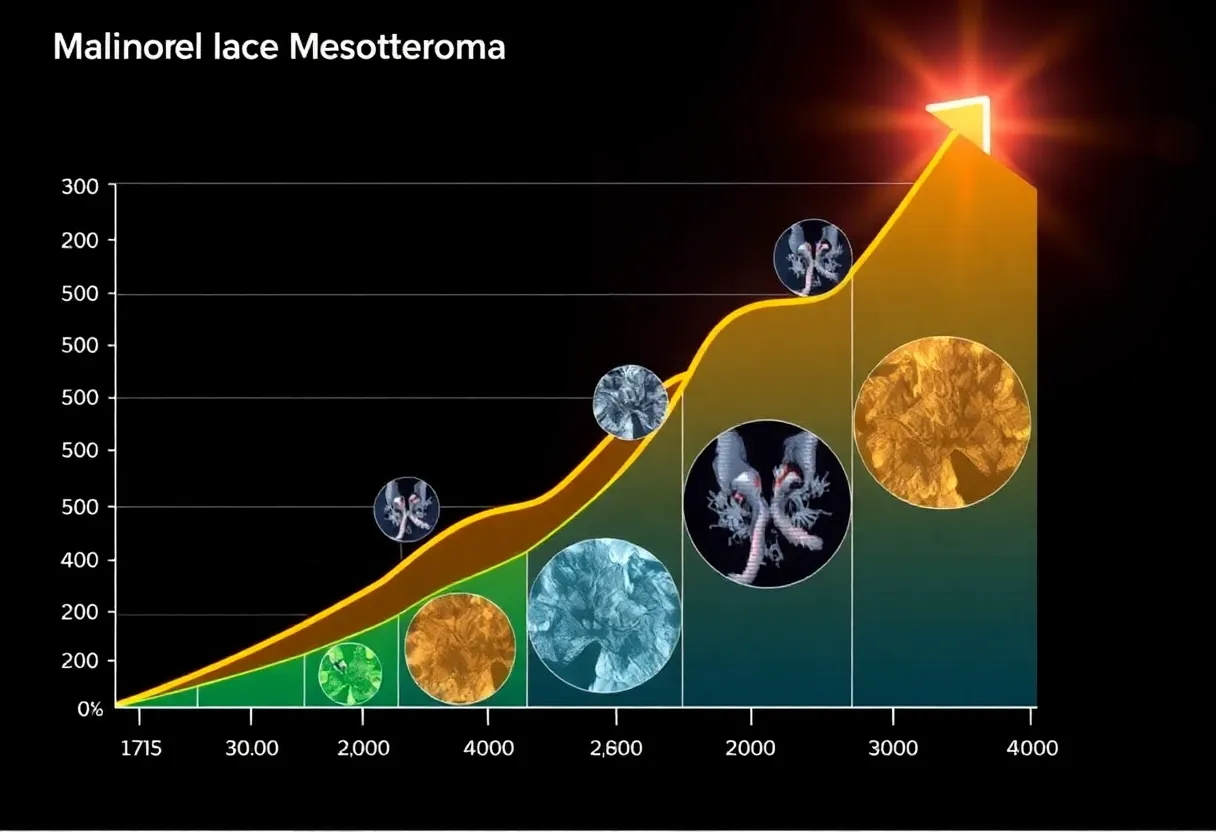News Summary
The malignant mesothelioma market is projected to grow significantly, with a value of US$ 12.2 billion by 2034, driven by advancements in treatment and detection.
Malignant Mesothelioma Market on the Rise: Growth Trends and Future Prospects
As the battle against malignant mesothelioma continues, the market is witnessing remarkable growth. With a current value of US$ 6.1 billion in 2023, projections indicate a staggering rise to US$ 12.2 billion by 2034. This represents a healthy compound annual growth rate (CAGR) of 6.5% from 2024 through 2034, suggesting a burgeoning industry fueled by innovation and advances in medical treatment.
Key Drivers of Market Growth
Several factors are propelling this market expansion. Chief among them is the increasing demand for innovative treatments such as pembrolizumab (Keytruda) and nivolumab. These therapies have demonstrated significant improvements in patient outcomes, painting a hopeful picture for those diagnosed with this aggressive cancer.
The rising focus on early detection methods—from sophisticated biomarkers to cutting-edge imaging techniques—is another critical driver. Health professionals and researchers are keen to prioritize early screening, which can lead to more effective treatments and improved survival rates.
Immunotherapy Takes Center Stage
The landscape of malignant mesothelioma treatment is increasingly dominated by immunotherapy. Pembrolizumab, a notable PD-1 checkpoint inhibitor, has shown commendable efficacy in prolonging survival and enhancing the quality of life for mesothelioma patients. Meanwhile, nivolumab, another promising PD-1 inhibitor, has begun to capture attention for its clinical trial results, especially when paired with ipilimumab, a CTLA-4 inhibitor. This combination therapy has already gained FDA approval, solidifying its role in the treatment regimen for mesothelioma.
The rise of personalized immunotherapy, utilizing genetic and molecular profiling, marks a significant shift towards tailored treatment plans aimed at the specific cancer subtype of each patient. This bespoke approach underscores a commitment to enhancing effectiveness while minimizing potential side effects.
Technological Advances in Detection
The development and integration of biomarkers such as soluble mesothelin-related peptides (SMRP), fibulin-3, and osteopontin are pivotal in improving early diagnosis of mesothelioma. Advancements in imaging techniques like HRCT and PET scans are revolutionizing how practitioners monitor disease progression.
Additionally, innovation reaches new heights with liquid biopsies that analyze circulating tumor DNA (ctDNA) for early detection. The incorporation of artificial intelligence (AI) and machine learning technologies is enhancing diagnostic speed and precision, creating a new frontier in oncological assessment.
Investment Boosts Research and Development
With a growing body of evidence supporting immunotherapy’s efficacy, investment in research and development is intensifying. Demand for personalized medicine is driving market expansion, leading to targeted therapies like bevacizumab and selumetinib, tailored to patients based on specific genetic profiles.
Prominent players in the malignant mesothelioma market include esteemed pharmaceutical companies such as Novocure, Bristol-Myers Squibb, and Merck & Co., Inc.. Novocure’s TTFields therapy has shown substantial promise when combined with standard chemotherapy, further diversifying treatment options.
Regional Market Insights
Geographically, the malignant mesothelioma market boasts major players like the United States, Germany, France, United Kingdom, Japan, Italy, and Spain. Notably, the United States leads the charge, fueled by innovative therapies and robust awareness campaigns that amplify understanding and detection of the disease.
Future Landscape of Mesothelioma Treatment
The report’s comprehensive analyses reveal a promising future for the malignant mesothelioma market. The shift towards precision medicine portends a transformative era in which treatment aligns more closely with individual patient needs, enhancing both outcomes and quality of life.
As research continues to evolve, the ambition to transition from traditional palliative care to targeted therapies for mesothelioma patients remains a clear objective, showcasing a dedicated pathway of progress and hope.
Deeper Dive: News & Info About This Topic
HERE Resources
FDA Greenlights Pembrolizumab: A Beacon of Hope for Mesothelioma Patients
Johnson & Johnson’s Bankruptcy Proposal Faces Third Judicial Rejection
Transforming Salem Chapel into a Vibrant Community Space
Family Appeals for Witnesses After Asbestos-Related Death
Reading Rugby Football Club Faces Closure Amid Asbestos Crisis
Regina Road Regeneration: Transforming a Troubled Community
Veteran Railway Engineer Wins Asbestos Injury Claim
Self-Employed Contractor Faces Legal Consequences for Asbestos Violations
Shocking Asbestos Scandal in Stockport: Contractor Endangers Lives
Widespread Asbestos Unawareness Among Government Employees Raises Urgent Health Concerns
Additional Resources
- OpenPR: Malignant Mesothelioma Market Size
- Wikipedia: Mesothelioma
- BioSpace: Malignant Mesothelioma Market Size
- Google Search: Malignant Mesothelioma
- OpenPR: Metastatic Melanoma Cancer Diagnostic Market
- Google Scholar: Malignant Mesothelioma
- BioSpace: Mesothelioma Market Size
- Encyclopedia Britannica: Mesothelioma



















